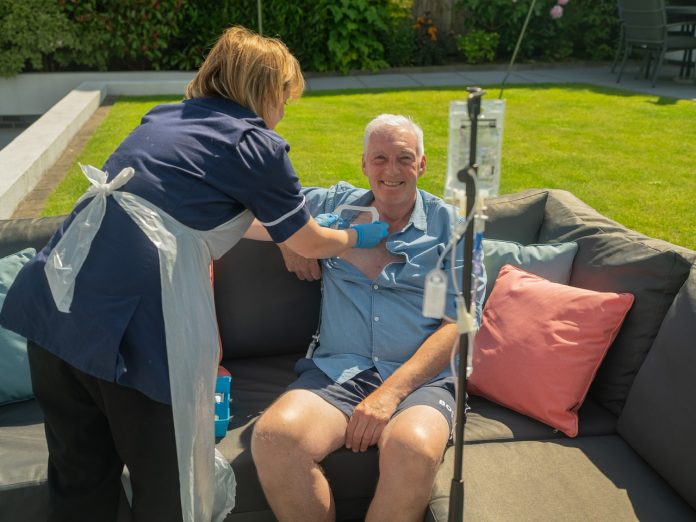retired headteacher from Bury, being treated for bladder cancer, can have immunotherapy treatment in his garden shed, thanks to a pioneering service provided by Manchester’s internationally acclaimed cancer centre, The Christie.
Des Burns, age 67, receives cancer treatment from a Christie nurse who visits his home. Last Christmas, when his sitting room was being redecorated, he had it in his garden shed.
He recently benefited from having the 50,000th treatment provided by the service since it was established in 2015. The treatment Des has at home is called Avelumab, which is given once every two weeks as a drip into a vein in around 60 minutes.
Des can have the treatment in the comfort of his own armchair, which gives him more time to spend with his wife, Roz, and allows him to help with the school choir at a local primary school, St Michael’s, where he is a governor.
In his spare time, Des enjoys regular visits to a holiday home in Ireland, keeping an immaculate garden, and playing the guitar.
Des was first diagnosed with bladder cancer in 2018, shortly before he retired. “I was over in Ireland when I first knew something was wrong,” said Des. “I was going to the toilet a lot but just thought I just needed some antibiotics. Then I saw there was blood in my urine – and a lot of it. I went to see my GP and was put on the cancer fast track.
“From Easter, everything happened quickly. I had an operation in June at North Manchester General Hospital, and they saved my bladder. Then, I was referred to The Christie in July, starting on my first lot of chemotherapy in August. I also had radiotherapy at The Christie.
“Despite the initial shock of the diagnosis, I never felt hopeless. Every medical professional I met said there was something that could be done, and I’ve been able to maintain a reasonable quality of life during the treatment. Family and friends have been very positive and supportive throughout.
“For three years, I was cancer-free, but a scan showed the cancer had spread to my lymph nodes, so I needed more radiotherapy and more chemotherapy. That seemed to work, and I was moved to an immunotherapy drug last spring. I have been having this at home since last Autumn. It leaves me a little tired for a day or two afterwards, but generally, I can get out for walks and enjoy my life.
“My wife Roz has been fantastic throughout and never complains. Even though I have most of my treatment at home, she still ferries me to and from appointments with my consultant and to have blood tests taken. My son and daughter, Andrew and Sinead, have also been very kind and supportive.
“Having The Christie on my doorstep is fantastic. They have a great system in place. I can book my blood test online at a convenient location in Bury, and they will phone me to check if I am well enough for treatment.
“The nurses who come out are very professional but also incredibly caring, attentive, helpful and reassuring. They are great company, too, whilst I’m having treatment.
“I had a rash once, and they phoned the hospital and arranged for a cream to be couriered to me. And when it became a struggle to get a cannula in, they suggested I have a port line fitted.
“As well as having more time for my family and the things I love, having treatment at home is great for my mental wellbeing. I don’t have to worry about getting stuck in rush hour traffic on my way to the hospital or finding somewhere to park. And I don’t get stuck in a long queue in the hospital waiting for treatment. Having treatment at home takes a lot of that stress away, particularly when you are having long-term treatments for five years or more. Not having to travel to the hospital in Withington is a massive relief when it’s snowing or raining.
“I am very active, but if someone is frailer, this kind of service must make a big difference to them.
“When I found out that my treatment was going to be the 50,000th the team has done since 2015, it really brought home to me just how many people have cancer. Incredibly, that is 50,000 times someone hasn’t had to travel to Withington for their treatment, and it must take pressure off the team in the hospital.
“I will now stay on this treatment for as long as it continues to work.
“I’m incredibly grateful to all those in the NHS who have cared for and treated me in urology, the surgeons, the oncologists, the rehabilitation team, the chemotherapy and immunotherapy team and the ‘at home’ team.”







